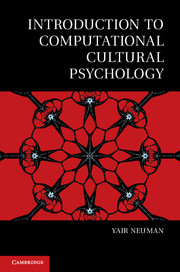Book contents
- Frontmatter
- Dedication
- Contents
- List of Figures
- List of Tables
- Preface
- Acknowledgments
- 1 What is computational cultural psychology?
- 2 The digital psychologist: information technology and cultural psychology
- 3 Why don’t primates have God? Language and the abstraction of thought
- 4 Lost in translation: how to use automatic translation machines for understanding “otherness”
- 5 Spies and metaphors: automatic identification of metaphors for strategic intelligence
- 6 Scent of a woman: the mediation of smell and automatic analysis of extended senses
- 7 Dolly Parton’s love lexicon: detection of motifs in cultural texts
- 8 The relational matrix of the I
- 9 Identifying themes: from the Wingfield family to Harry and Sally
- 10 Eating and dining: studying the dynamics of dinner
- 11 Getting even: the cultural psychology of revenge and what computers can do about it
- Epilogue: on generals and mail coach drivers
- Bibliography
- Author index
- Subject index
8 - The relational matrix of the I
Published online by Cambridge University Press: 05 June 2014
- Frontmatter
- Dedication
- Contents
- List of Figures
- List of Tables
- Preface
- Acknowledgments
- 1 What is computational cultural psychology?
- 2 The digital psychologist: information technology and cultural psychology
- 3 Why don’t primates have God? Language and the abstraction of thought
- 4 Lost in translation: how to use automatic translation machines for understanding “otherness”
- 5 Spies and metaphors: automatic identification of metaphors for strategic intelligence
- 6 Scent of a woman: the mediation of smell and automatic analysis of extended senses
- 7 Dolly Parton’s love lexicon: detection of motifs in cultural texts
- 8 The relational matrix of the I
- 9 Identifying themes: from the Wingfield family to Harry and Sally
- 10 Eating and dining: studying the dynamics of dinner
- 11 Getting even: the cultural psychology of revenge and what computers can do about it
- Epilogue: on generals and mail coach drivers
- Bibliography
- Author index
- Subject index
Summary
“Man is never coincident with himself”
I concluded the previous chapter by suggesting that the modern representation of love is comprehensible only as synergetic threads. The gentle love described by Parton can be traced back to our most basic embodied patterns of attachment to significant others. However, locating the peak of those metaphors in Romanticism suggests that our concept of love has been somehow transformed by culture and at a specific point of our cultural history. I have suggested that love has become more relational and sublime. However, the meaning of this term “relational” should be explained. To explain the relational nature of modern love and its very specific sense, I first dedicate this “noncomputational” chapter to explaining the meaning of our relational self. In trying to explain the relational nature of the self and to introduce the methodology through which we expose relational patterns in text, I first explain an important aspect of our language and our “trust” in guiding us to deep layers of meaning.
From the perspective of semiotic cultural psychology, relations are exposed mainly by analyzing the language of those who establish relations. Understanding the relations of Harry and Sally in When Harry Met Sally is impossible without paying close attention to the things the characters say and of course avoid saying. Understanding family as a relational system is impossible without carefully analyzing the verbal communication patterns between members of a family. However, analyzing language in order to expose deep layers of meaning assumes basic trust in the way language can guide us, whether to expose the deep psychological layers of a person or of a given culture.
- Type
- Chapter
- Information
- Introduction to Computational Cultural Psychology , pp. 126 - 138Publisher: Cambridge University PressPrint publication year: 2014



